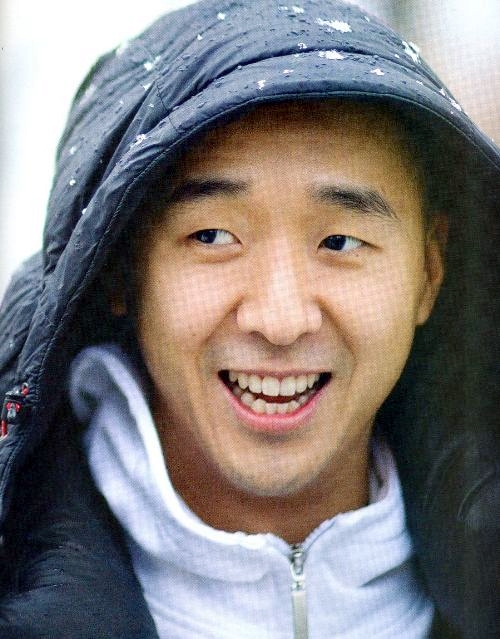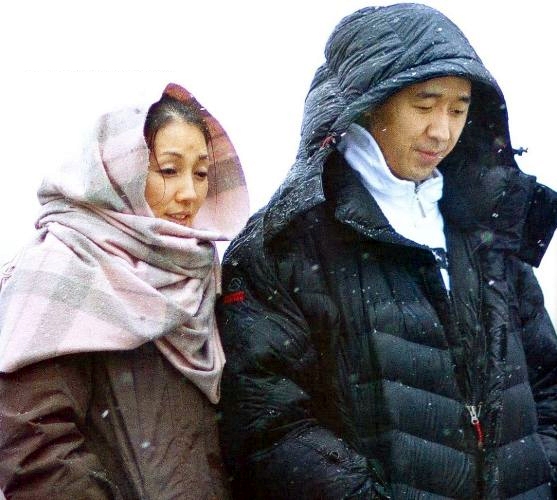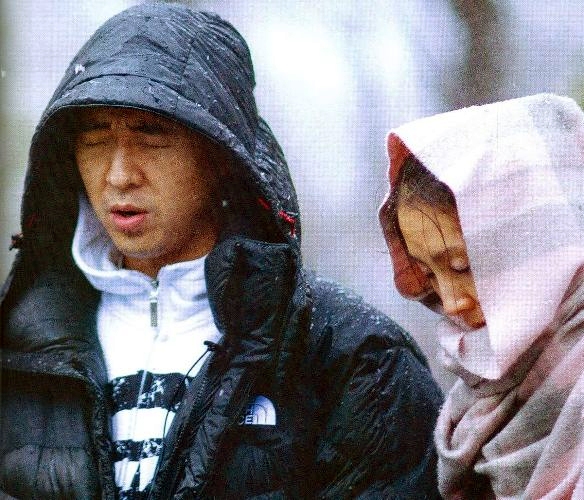![]()
The Words of Hyung Jin Moon
|
|
The Words of Hyung Jin Moon |

The pulpit can be a lonely place, and throughout religious history, it certainly has been. Whether among Christian priests, Hindu sadhus, Buddhist monks, or even secular philosophers such as Pythagoras, celibacy has been a pursued practice by countless religious---and thought leaders. Yet Reverend and Mrs. Sun Myung Moon, as a couple came to challenge such a practice by teaching that fulfilling one's purpose involved receiving the Marriage Blessing and creating an ideal family. His youngest son Reverend Hyung Jin Moon took those teachings to heart when he assumed presidency of the Unification Church in the United States -- not alone, but together with his wife Reverend Yeon Ah Lee Moon.
Question: As a hypothetical, let's say you were just another member. And someone said, "hey, you get to start a national program for the American movement." what would it be?
Hyung Jin Moon: Everybody knows I love martial arts. I see Mixed Martial Arts (MMA) connected to a strong America and a strong Korea -- good Abel democratic countries being strong, not being weak. I haven't really taught martial arts in any official capacity; I'm not a black belt yet in Jujitsu, for example, and I don't teach at a dojo. But I have taught it and I have always loved it -- all of martial arts -- and the disciplining of the self and the endless evolution, self-cultivation and training that's involved in it. I love how it's also connected to meditation, which is a huge part of my whole journey and practice.
Martial arts in many traditions was rooted in religious monastic life. So MMA is connected to other arts, such as meditation and tea ceremonies, which are wonderful and which I practice to this day. Shaolin temples, Japanese samurais and even Zen priests were very rooted in religious practice, discipline, meditational life and the practice of self-defense.
Some of my own loves and hobbies really center around these arts -- especially those of Japan like the bushido arts and the arts of the samurai -- as they are connected to meditation, focus, training, martial arts and tea ceremonies. Father was also a huge martial arts enthusiast.
So, hypothetically speaking -- and not to be confused with this being a possibility for me any time -- if I were "just another member," and had the opportunity to start a small group, I would love to include people in learning the arts of MMA.
Yeon Ah Lee Moon: I'm a mother of five, so I really want to see our Unification Church families bloom the way that Father Moon intended. My husband and I were pastors at the Korean Unification Church in Seoul for three years, and we are very proud of many aspects of it, such as being financially independent and creating a strong organization, among other things. But I learned that one thing an organization cannot assist in is helping members build strong families and install really strong faith within our families. This is something individual families have to work on. It's not something anyone can give to a family. We can make good programs at Unification Church Headquarters to implement in local churches, but unless members really take ownership of those programs, they are not going to make an impact.
What I really want to see is members taking ownership to continue growing the number of small groups in their local communities. There are many different types of small groups, such as evangelical small groups and social-activity-based small groups created between friends. I feel that if we can combine these two types of small groups, make small groups of 5-6 members and teach the four schools of love (parent, couples, child and siblings love) or Divine Principle lectures, etc., then within these small groups people can teach each other what the purpose of life is. Everybody will, in time, resemble the really great heart of True Father and great heart of True Mother and the ideal family that God initially intended to have. Teaching how to be a true couple, for example, at the grassroots level with others in the same setting also makes it easy to invite people and express to them who we are and really testify to True Parents naturally. From the grassroots up, these new sparks cans glow brightly. But we need to take ownership of these small groups. That would be really amazing to see. That's something I really want to see.

Question: I know you've spoken already about the atheism versus theism debates. In America these debates are held at the college-age level. So, the rest of America hasn't had the opportunity to explore this. Could you please share a few words about that?
Hyung Jin Moon: I think it is primarily for people who are college-aged. People at that age are seeking intellectual reasoning or are contemplating different ideas. Most people beyond that age may already believe in God, but people who are younger tend to struggle with this issue. In Korea, we began these debates primarily to target college-aged people. The question of God's existence is something that I struggled with and so it was very helpful for me to have a logical framework to have God's existence explained with actual evidences for God's existence as being rational and scientific, not the opposite: irrational or unscientific, etc. And these kinds of rationalizations are an essential starting point for those who want to begin a life of faith.
Question: Did you initiate the debate program?
Hyung Jin Moon: Most of the material was taken heavily from William Leigh Craig's material, and I distilled it. We then put it into a PowerPoint presentation where students at Sun Moon University, Father Moon's school in Korea, would learn both the theist and atheist positions, and then how to address certain atheistic reposts.
Yeon Ah Lee Moon: We also held these debates in the Cheon Bok Gung (Unification Peace Temple).

Question: So if say, for example, you held a debate inside Sun Moon. You would get two groups of students who were enrolled in Sun Moon. And they would debate each other?
Hyung Jin Moon: Yes, we would have Unificationist students debate, for example, Chinese students who were enrolled there, who are atheists. That would be held as a public forum, a public debate. So there was much preparation.
Question: So for your pilot program you actually found people who are atheists to debate with?
Hyung Jin Moon: Yes, in Sun Moon we did that, and we want to hold these debates on a wider platform.
Question: In these pilot runs. Who usually won?
Hyung Jin Moon: Theism won over atheism. The students did great; they were perfect. People who are usually of atheist persuasion believe that theism is some type of medieval conception or just some kind of draconian idea, and that it's going to be easy to rebut as long as they put some science in the pro-atheist argument. What they don't realize is how developed the whole realm of theism philosophy has been, so I think they were unpleasantly surprised. We were able, at least for a pilot test run, to illustrate the success of these debates, and we were trying to get more of them on a wider scale before we tried them here.

Question: So you have the content but it's in Korean, I assume?
Hyung Jin Moon: I wrote it in English first, and then we translated it. So in America I think we are ready to go forward with the content we have. We have awesome resources here and I think it's a program that can really burgeon here. Particularly, I think, for younger people, though older people who already believe in God will only be reconfirmed and find reaffirmation.
Yeon Ah Lee Moon: Studies show that in the late teens and early 20s people converted faith by intellectual persuasion. They feel, "This is it. I can commit myself." That's how they are converted. That is why a lot of our first-generation Unificationists converted when they heard the Divine Principle for the first time. They thought, "This is something I can really put my faith in," and that is why they were able to put everything aside and become full-time members. Studies also show that once an intellectual conversion is made, the mindset turns to, "I love this community, I love these people, I want to learn from this." So intellectual conversion leads to loving the community that inspired the conversion. And again, this occurs mainly in college-aged youth.
Question: I can see the atheism/theism debate program is a passion you both share. I heard a rumor that you also have a desire to illustrate children's books?
Yeon Ah Lee Moon: Oh yes. I actually made one. It was my graduation project for university. I think it's just a personal thing: I'm so embarrassed to show it though. It was more something that I just really cherished for myself. I made it 6-7 years ago. Wow. Actually, yesterday I was pulling out some of my 6 to 9-year-old paintings and I looked through them and thought, "Wow I drew this. I really drew this." I was amazed with myself. The book I created is about a big old tree and a seed and in the tree is a face. I drew Father Moon's face in the tree.
Hyung Jin Moon: I love that picture.
Question: Maybe you can exhibit in the art gallery at the next blessed culture and sports festival (BCSF).
Yeon Ah Lee Moon: Oh my gosh, people will laugh at me. Actually, right now, what I'm more interested is religious art. I love children's books, I love cartoons, I love Manga. He (Hyung Jin Moon) can testify to that. Once, I wanted to become an animator. After Father Moon passed away, I started to feel that he was in everything.
After Father Moon's ascension I could sense him everywhere... every breath I took, every step I took, Father Moon was there. It is my desire now to express that. I want to somehow express that in a painting or in some form. In our church, it was not considered good practice to depict Father Moon as a really glorious and holy figure, and only a portrait has been allowed. But I always felt this did not depict Father Moon as the Messiah and Second Coming. I want to spend some time contemplating these things and I want to encourage artists in our church to do so as well.
As a pastor's daughter, I saw the church unfold from the day I was born, and I really want this church to blossom. It was not because of the lack of True Father, the lack of True Parents or the lack of the Divine Principle that our church did not bloom. Maybe we could not organize ourselves properly, but if we manage it right and have confidence as Unificationists that we can make things amazing. Of course I understand that there are many organizational levels and many rumors about our church even to this day, but if we can just believe that we can make great changes and move forward, then I believe we can make this church into something really substantial. More than painting a beautiful painting, this is where my passion lies and that's something I'd love to see before I pass away. Unificationism may not become the national religion of America, but it can become better than it was before. That's something I really have a passion for.